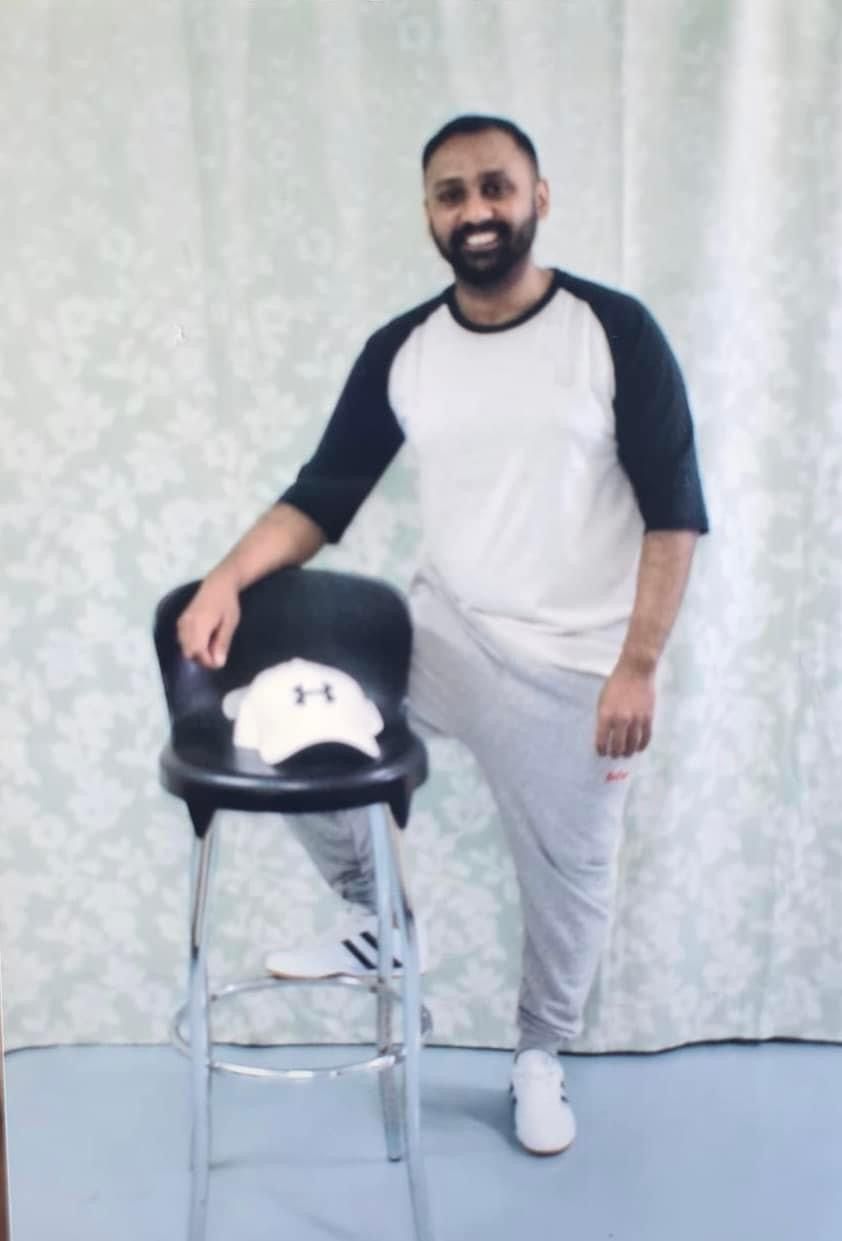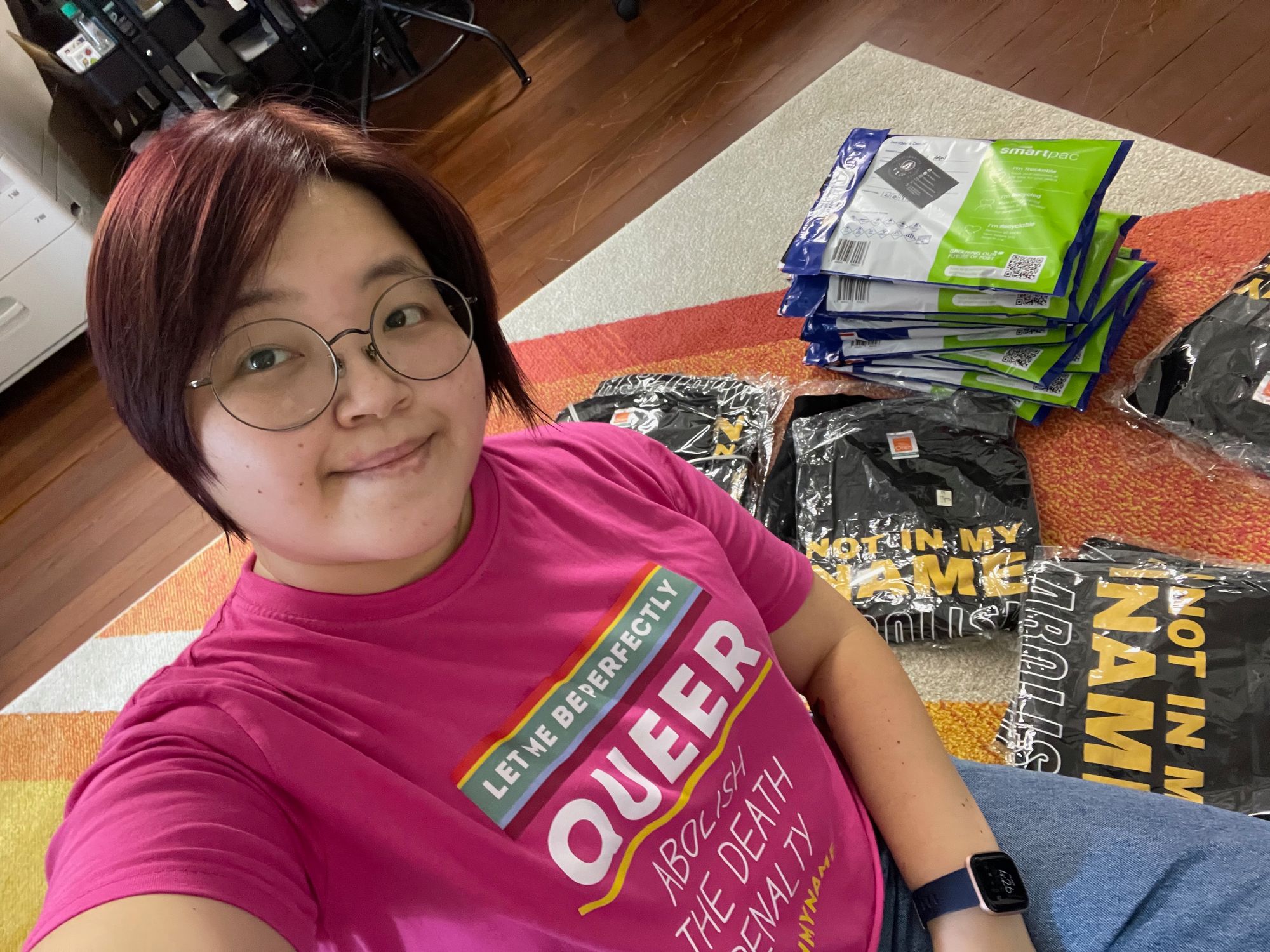I feel like almost every week I start off the newsletter with some comment along the lines of “omg WHAT A WEEK IT’S BEEN”… but seriously, it’s been a long time since I’d been as ill as I was last week (and IT WASN’T EVEN COVID). It was miserable, especially since because I really wanted to be out and doing something helpful and useful. I think I’ve bounced back now — thanks be to the mighty antibiotic — and am trying to get back to a good work/life routine.
Rest in Power, Kalwant Singh and Norasharee bin Gous
Kalwant Singh and Norasharee bin Gous were both hanged in the early hours of Thursday morning.
I started Thursday morning sitting at the bus stop outside Changi Prison, where a crowd of people had gathered to wait for Norasharee’s family to come out after claiming his body. Kalwant’s family arrived as I sat there; I hugged his older sister Sonia tight. “They killed my brother.” She was already sobbing, wrecked with grief and disbelief that her brother, who had been so full of life and laughter less than 12 hours ago, was gone. And now they had to go into prison to see him, cold and lifeless, and to prepare for his funeral.
Norasharee’s sister looked exhausted when I saw her at the mosque. It was hot and crowded, and when they brought out his body a long, snaking queue formed, so many people wanted to pay their respects. More were waiting at the cemetery, by his burial plot, so they could say their final farewell to the man everyone knew as Boy Ayie.
We left the hundreds-strong crowd at the Muslim cemetery and headed to the short wake for Kalwant in a small memorial hall. He was lying in a white-and-gold casket, smart in a suit and garlanded. Sonia sat by him, stroking his face, his brow, his chest, making sure everything was perfect for him. Her daughter Kellvina, the niece Kalwant had lovingly raised even though he’d only been a teenager himself, stood by her side.
“It’s too cruel, it’s too cruel,” Kellvina said to me, tears streaming down her face. Then she managed a shaky smile. “He’s very handsome, right?” The last time I’d met Sonia and Kellvina, at the beginning of June when they’d come to Singapore for their first family visit since the pandemic, they’d been puffed up with pride telling me about Kalwant’s looks and charm. We hadn’t expected, then, that he would have so little time left.
“You see what they’ve done to my handsome brother,” Sonia whispered from her seat by his casket. “They’ve given us broken pieces of my brother.” She paused. “But now he’s free.” Periodically throughout the wake, she would speak lovingly to Kalwant, her hand on her baby brother’s head.
Kalwant had been a ray of sunshine. He had insisted that his family speak only of happy things when they visited; even his final family visit had been full of jokes and laughter. Those who had met or spoken to him, even in the final week of his life, described him as full of life and optimism, someone who made you feel like things were going to be okay. You would come out of a prison visit with Kalwant a happier person than when you went in.
After nine years behind bars, Kalwant was finally able to return to his home in Cameron Highlands. It was his final wish.

🕯🕯🕯
Throughout the day, numbers tumbled around in my brain. Eight execution notices issued in 2022. Four already hanged. Over 60 people on death row, over 40 with their legal avenues exhausted. Exactly a week after Kalwant and Norasharee’s hanging, on 14 July, it'll be five years since Prabagaran Srivijayan was hanged. Five years since his mother, with her smattering of English, told me “no more already, my son.” Between 2017, the year Praba was hanged, and today, there have been 29 executions. Between 2010, the year my anti-death penalty activism began, and today, there have been 43 executions. Between 1991 and today, almost 500 people have been executed by the Singapore state, most of them for drugs.
When will it end?
FICA has arrived. Some of it, anyway.
FICA, a monster piece of legislation, was pushed through Parliament last October. After over half a year without updates, part of it has come into force. The government can now order social media companies and Internet service providers to investigate attempts at foreign meddling. Other actions of the legislation, like those that allow the authorities to classify people and organisations as “politically significant”, and to deal with foreign interference via local proxies, will come into force later, according to the Ministry of Home Affairs.
This is a good time for me to direct all subscribers to this December 2021 issue that I wrote on FICA and how it could potentially affect this newsletter. It’s also why I have this page on privacy and data.
Prison conditions finally get some attention
In May, we at the Transformative Justice Collective released this report on prison conditions. (I’ve been meaning to write a special issue on this, but there was so much going on — it’s coming I promise!) It’s made some impact, because it was mentioned when prison conditions were discussed in Parliament this past week. In particular, it was brought up that our report had described mental health care as “abysmal”. Formerly incarcerated people interviewed for our report had described being cuffed to beds in the prison psychiatric ward if they admitted to suicide ideation. The report says:
“While in the psychiatric ward, the respondents who spoke to TJC had not been allowed to shower, nor go to the toilet. Instead, they had to defecate and urinate in a container next to the bed, and were not able to wash their hands after. Prisoners could only clean themselves with one hand, with the other still cuffed to the bed.”
Minister for Home Affairs and Law K Shanmugam didn’t directly address these claims, which I personally interpret as an implicit admission on the part of the government that the conditions the interviewees described are true, because if that wasn’t the case, I’d have expected him to be all over TJC, POFMA-ing the crap out of the report and slamming us in Parliament as liars and God knows what else. (An additional note: TJC had sent a close-to-final draft, with questions and clarifications, to the Singapore Prison Service prior to publication, but never heard back from them.)
However, Shanmugam did reveal that about 5% of the current prison population are on medication to manage mental health conditions, with adjustment and mood disorders being the most common conditions. He also defended prison conditions as “acceptable”, with a strict regime to keep prisoners from harming themselves or endangering security. He also noted that Singapore has lower assault and suicide rates in prison than in other countries. Sure, but if one reason for the lower suicide rate is because we’re cuffing people to beds, then that’s an extremely, extremely low bar. Just because someone can’t die by suicide doesn’t mean that we’re providing real care or support.
There were also questions in Parliament about releasing statistics on the racial composition of the prison population, but Shanmugam rejected that suggestion because he said that could “deepen” stereotypes. 😑 It’s already well-known that the majority of the prison population are ethnic minorities. What we need is more data and open conversation about the situation — refusing to release statistics doesn’t actually do anything to help understanding.
One of the things that I do at the Transformative Justice Collective is manage our TJC Support Fund. We use this fund to help meet the needs of families of people on death row, many of whom are working class and struggle to afford things like legal filing fees (which can be very high), or, if they are not based in Singapore, transport and accommodation to come for prison visits. And, if the worst happens and an execution takes place, we might also have to help families with funeral arrangements. This is what we’ve been doing for Kalwant Singh’s family over the past week, and there are other needs related to the cases of other death row prisoners coming up.
If you’d like to contribute, you can find the details here. If you’re using Donorbox, please select “TJC Support Fund” in the drop-down menu. If you’re using PayNow, please add “TJC Support Fund” in the notes/reference, so I know that it’s earmarked for this purpose.

Thank you for reading this week! As always, please help me spread the word about this newsletter by sharing it widely.
